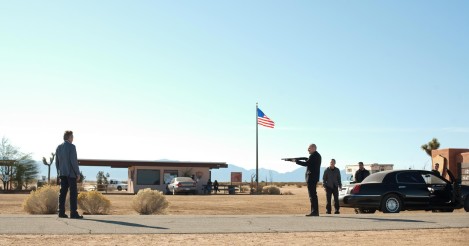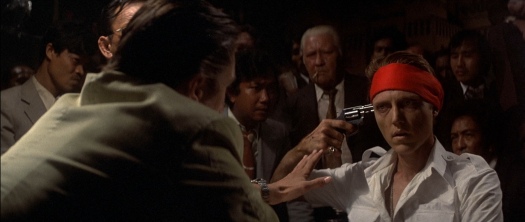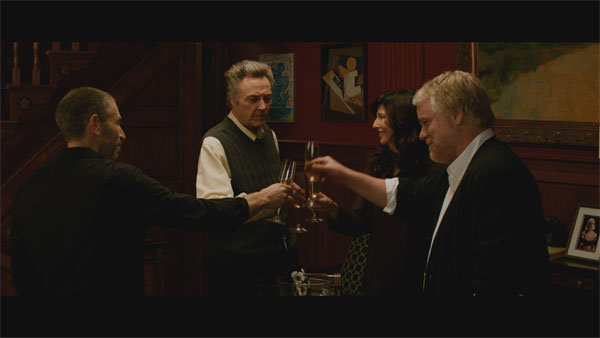Craig Modderno is an Awardsline contributor
“I make movies that nobody will see. I’ve made movies that even I have never seen,” exclaims actor Ronald Walken who has been working in pictures since director Sidney Lumet cast him in his first showy role as the kid in 1971’s The Anderson Tapes when the world met him as Christopher Walken.
“My hair was famous before I was!”
Even off camera, the actor’s wry sense of humor exudes. Blessed with a self-punctuated, Queens cadence, which he can easily massage from cryptic to sarcastic, Walken at 69 is continually in demand across every genre. His dramatic flair is so iconic, comedians from Jay Mohr to Kevin Pollak impersonate him. Heck, Walken even impersonates himself (check out this hysterical video of him reciting Lady Gaga’s “Poker Face”)
Early this fall, Walken walked on the wild side in CBS Films’ shoot-em up comedy Seven Psychopaths as Hans, a rambling dog-napper who doles out screenplay advice until he dies (literally). In the upcoming Stand Up Guys, Walken gets guffaws as a geriatric gangster. But it’s his turn as Peter Mitchell, a renowned New York City cellist who contends with his Parkinson’s disease, in A Late Quartet that has awards voters buzzing. Rather than playing the heavy this time around, Walken’s Peter is one of his heaviest roles in years, rivaling his Oscar-winning supporting turn as Nick, the Russian Roulette Vietnam soldier masochist in 1978’s The Deer Hunter and his second Oscar-lauded role as a failed father to Leonardo DiCaprio’s master grafter Frank Abagnale, Jr. in 2002’s Catch Me If You Can.

AWARDSLINE: What drew you to three distinctively different roles in A Late Quartet, The Stand Up Guys and Seven Psychopaths?
CHRISTOPHER WALKEN: I liked the scripts, and the directors. It’s strange that all these films are coming out now since they were all made during the past 2 years. I have no specific criteria — except the rare one that doesn’t have me kill someone goes to the top of my reading pile. (Laughs) It’s true. When I read a script that I cut out in my mind — all punctuation and directions which is the reason for my unusual screen patterns on camera– that process helps me find the character on my own and probably makes it easier for comics to impersonate my characters.
AWARDSLINE: A Late Quartet seems like your most serious film in a while. Why is that?
WALKEN: Well if you won’t tell anyone it’s because I don’t kill anybody in the film. As I get older, I start to get parts for grandfathers and people who give great advice…the parts Michael Caine will seemingly be able to play forever. I will still play wise guys, troublemakers because I like playing crazy guys and villains. Plus the economics of making films today are so unpredictable that even small films fall apart often right before shooting.
AWARDSLINE: What did you do to research your role in A Late Quartet?
WALKEN: I don’t like to discuss my process generally in preparing for a role. If I tell you I studied cello then you’ll watch my playing more carefully and perhaps pay less attention to the story.
AWARDSLINE: Was it a competitive atmosphere between you and your co-stars on the film?
WALKEN: No, only what the script called for. They were all excellent actors and very nice people. We all knew we were making a very special film.
AWARDSLINE: Do you look for something specific in a dramatic role that tells you it will be a challenging part?
WALKEN: No for me it’s more of a feeling: “Am I good at playing the part?” I read scripts for myself, which is why I erase punctuation because sometimes a question could actually be a statement. I read the scripts as if they play the way I think my character would respond, not what a reader would think how they would play my part.
AWARDSLINE: At this stage of your career what do you want from a director?
WALKEN: To hire me! (Laughs) I want him or her to be sure about the information and history of the project, so the actors become kids in a sandbox; feeling free, playing together. If you don’t cast well, the movie has a hard time getting a rhythm of its own. The best directors like Mike Nichols, Sydney Pollack, Marty Scorsese and Paul Mazursky to name a few who direct, are also excellent actors so they’re careful choosing the right actor. Besides Sidney Lumet, Michael Cimino and Steven Spielberg, who taught me a lot about my craft, I’ve been lucky in taking chances and calculated choices with some of the best directors of our times.
AWARDSLINE: What impact did winning the Oscar have on your career?
WALKEN: It was enormous. It brought me recognition from the industry that resulted in me receiving better scripts and for the most part not having to do auditions.

AWARDSLINE: How competitive was campaigning for an Oscar in the 1970s?
WALKEN: I never campaign for personal attention from the media. I do go on press junkets when the film warrants that kind of attention because I consider that part of the job. Most films’ press peters out quickly, which is the good thing about the so-called awards season is that a fine film like A Late Quartet gets a special spotlight shown on it. I used to never do internet interviews because I don’t own a computer or a cellphone. My friends are surprised that I don’t, but sometimes I think we’re in an age of too much information.
AWARDSLINE: What was it like being at the ceremony where your film The DeerHunter faced strong competition from another Vietnam War film Coming Home?
WALKEN: I’ve been there as a nominee twice and there’s nothing better than winning. But I remember exiting the ceremony the second time and truly believing we were all winners even though only a few of us were holding statues. Then they give you a really nice dinner even if you didn’t win an Oscar.
AWARDSLINE: You co-starred in Heaven’s Gate, which is considered one of the biggest disasters in film history. What did that negative response do for your psyche?
WALKEN: It wasn’t anything good. I never really understood what the enormous fuss was about. There was lots of stuff written at the time that was over the top, especially books written on how the failure of the film sunk United Artists. But since (director) Michael Cimino’s previous picture The Deer Hunter had won several Oscars, it created a new area of opportunity to bash Heaven’s Gate because the expectations were higher.
AWARDSLINE: You were supposedly the number two choice to play Han Solo in Star Wars. How did you feel when it became a classic worldwide hit?
WALKEN: No feeling because I was only one of hundreds of other guys who auditioned for the role. I don’t think I’m the best actor to play a role that spins off into an action figure doll.
AWARDSLINE: Another film you almost got the lead in was Love Story. Could you have said the line “Love Means Never Having to Say You’re Sorry” with a straight face?
WALKEN: It was just as well that I didn’t get the role. I believe an actor gets certain jobs at the right time in his or her career. A critic once wrote of my stage performance as Shakespeare’s Romeo is that one of my unique qualities is everything I said sounded so sarcastic. Maybe if I had done Love Story then comics today would be having fun doing me doing my dialogue from the film!
AWARDSLINE: Is it true that at age 10 you did a TV Comedy skit with Jerry Lewis and he encouraged you to pursue a career in show business?
WALKEN: Yes. It was The Colgate Comedy Hour. They recently found a kinescope of it which I saw. I had a couple lines in the skit and it was shocking that I hadn’t changed my acting style at all. (Laughs) I’m amazed I’ve gotten this far. Knock wood, they let me continue. Maybe part of the reason is I don’t live my characters — many of whom scare even me — off screen. Perhaps the one little kid quality that I’ve duplicated was during the making of The Deer Hunter, I would hide in the shadows and watch my fellow actors because I knew how good they were.

